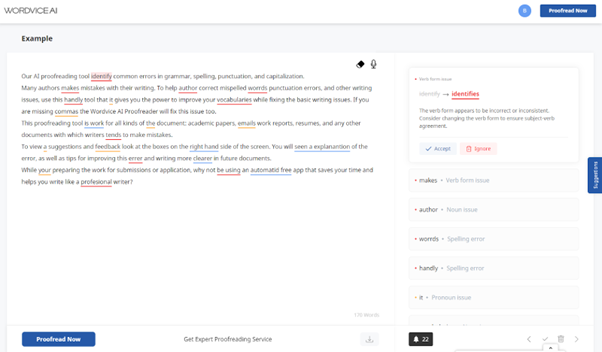6 Self-Editing Tips to Strengthen Your Writing
What is self-editing?
Self-editing is the process of revising your work to the best of your own abilities before submitting it to a publisher (or self-publishing online). For those who do not have access to consultations or private tutoring, following best self-editing practices is crucial. See below for a self-editing checklist, then read on for tips on how to edit your writing using a free AI proofreading tool tools before receiving expert proofreading services.
Self-Editing Checklist
After you finish drafting a piece of academic, break the potential writing and punctuation issues in your work into categories and ask yourself some basic questions to help you self-edit your paper.
Content Issues
|
Grammar and Mechanics Issues
|
Style Issues
|
Self-Editing Tips for Any Academic Paper
1. Print out your work on paper
Having your writing on physical paper can help you more easily identify errors and awkward sentences or phrases. The key to self-editing is to examine your own writing as if it has been written by someone else. This means you should do everything you can to look at your writing differently from when you were writing it. You probably did your writing on a bright computer screen, so printing your writing out onto paper can help you look at it differently. You can use a pen to mark the text and write on the margins as you proofread. This is also a good way to give your eyes a break, as text on paper is also less straining than text on screen.
2. Change the font of your text
Changing the font of the text on your word processor is another easy way to make you look at your writing differently. This can be especially helpful if you do not have access to a printer or simply have too many pages for printing to be a practical option. To take this tip a step further, try changing the font to one that is easier to read.
Times New Roman is the standard for many academic manuscripts and college essays; however, the most readable font is actually Georgia. For this reason, it is the font used by major new publications, including The New York Times, The Wall Street Journal, The Telegraph, and The Guardian. You could also combine this tip with the previous one and change the font of your text before printing it out.
3. Take a break before self-editing
Start your revision process early so that you have the time to take sufficiently long breaks from editing. Many of us have the experience of putting off writing until the last minute, then trying to revise our document after a day of working on it non-stop. This is not ideal, as your brain and eyes are likely exhausted, and you have spent so much time with the text that it is impossible to assess it from an outside perspective. In contrast, if you start and finish your draft earlier, you will have more time to revise. You can use some of this extra time to take breaks away from your work, then return to it with fresh eyes.
4. Have someone else read your paper aloud
You have probably heard that it is a good idea to read your writing out loud. However, an even better way to catch any awkwardness in your writing is to have someone else read it aloud to you. As long as your writing is not too long, your friends, classmates, or colleagues will likely be more than happy to help. That being said, you may feel self-conscious about showing your draft to others, especially in the beginning of the revision process. In that case, try recording yourself reading your work and then play the recording back to yourself.
5. Use AI proofreading software while editing your work
There are a surprising number of automated writing assistants and proofreading software programs available online. These grammar checkers cannot replace a professional human editor. However, they are easy to use and can provide valuable assistance during the drafting process — simply type or copy-paste any written content into the designated text box.

As mentioned above, you have many options when it comes to AI proofreading software. The Wordvice free AI Writing Assistant includes a free proofreading tool that has been trained with real research papers and uses multiple large language models (such as ChatGPT), making it ideal for academic writing. It provides more academic alternatives for words and expressions on top of identifying grammar mistakes and stylistic errors. You can also read about how Wordvice AI pairs with other best AI tools for research to make your writing as compelling as possible.
In addition to the AI Proofreader, Wordvice AI also offers a free paraphrase tool, AI text summarizer, AI translator, AI plagiarism checker, AI Detector, and AI Grammar Checker to make sure your written work is ready for submission.
6. Use professional editing services
Professional proofreading and editing services are not just for the final step of the revision process. If you are stuck on how to improve your work, getting input from an expert editor can be a great way to spark new ideas and identify your weak points. Wordvice has over 500 English-speaking editors holding PhDs or other advanced degrees.
Our academic editors have a combined average experience of over five years each, and their specializations span nearly 2000 academic subdisciplines. Our admissions editors also have many years of experience revising admissions essays, personal statements, CVs, and other related documents. They have attended top schools in the US, UK, Canada, and Australia, and many of them have worked in university admissions departments. Check out Wordvice’s professional English proofreading and editing services today and take your writing to the next level.



